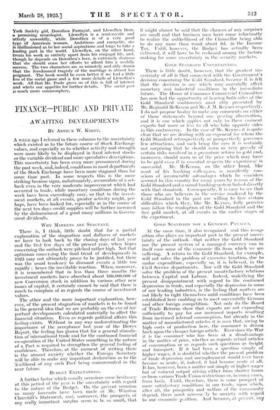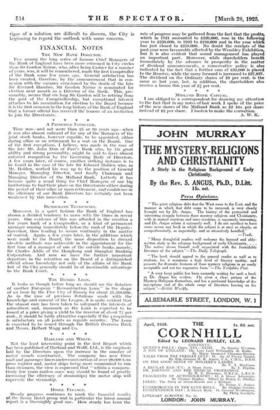F INANCE-PUBLIC AND PRIVATE
AWAITING DEVELOPMENTS
BY ARTHUR W. KIDDY.
A WEEK ago I referred in these columns to the uncertainty which existed as to the future course of Stock Exchange values, and especially as to whether activity and strength were more likely to be displayed in fixed interest stocks or the variable dividend and more speculative descriptions. This uncertainty has. been even more pronounced during the past week, and, indeed, conditions in most departments of the Stock Exchange have been more stagnant than for some time past. In some respects this is the more striking because-signs, unfortunately, accumulate of a set- back even in the very moderate improvement which had occurred in trade, while monetary conditions during the week have been exceedingly easy, so that in the invest- ment markets, at all events, greater activity might, per- haps, have been looked for, especially as in the .course of the next ten days credit supplies will he further increased by the disbursement of a good many millions in Govern- ment dividends.
WHY MARKETS ARE STAGNANT.
There is, I think, little doubt that for a partial explanation of the stagnation and dullness of markets we have to look back to the closing days of last year and the first few days of the present year, when hopes concerning the outlook were pitched rather high. Not that optimism conecraing the final trend of developments in 165 may not ultimately prove to be justified, but there was the usual tendency to discount events a little too rapidly ; -hence the inevitable reaction. When, moreover, it is :remembered that in less than three months the investinei. it markets have absorbed about £60,000,000 of new Conversion stock in addition to various other new issues- oicapital, it certainly -cannot be said that there is much to complain of as regards the course of investment values.
The other and the more important explanation, how- ever, of the present stagnation of markets is to be found in the general idea that we are probably on the eve of Mil peortarit developments calculated- materially to affect the financial situation. Even as regards political affairs this feeling exists. Without in any way underestimating the importance of the acceptance last year of the Dawes Report, the feeling has grown that for a general stimula- tion of international trade and for the continued financial co-operation of the United States something in the nature of a Pact is required to strengthen the general feeling of confidence. Therefore, at the • moment of writing there is the utmost anxiety whether the Foreign Secretary wiWbe able to make any important declaration as to the likelihood of any such- Pact -being consummated in the near future.
BUDGET EXPECTATIONS.
A further factor which usually occasions sonic hesitancy at this period of the year is the uncertainty with regard to the nature of the Budget. On the present occasion so many . forecasts have been made of Mr. Winston Churchill's • Statement, and, moreover, the. prospects of any really important surplus seem to be so small, that it might almost be said that the chances of any surprises are small and that business men have conic reluctantly to realize the unlikelihood of the Chancellor being able to do any more than remit about 6d. in the Income Tax. Until, however, the Budget has actually been delivered, it will have to be reckoned among the factors making for some uncertainty in the security markets.
GOLD STANDARD UNCERTAINTIES.
There is little doubt, how-ever, that the greatest un- certainty of all is that connected with the Government's decision: concerning the Gold Sandard, because it -is felt that the decision is one which may materially affect monetary and industrial conditions in the immediate future. - The Rouse of Commons Commercial Committee has now- ,had the opportunity of hearing both sides of the Gold Standard controversy most ably presented by Mr. Reginald McKenna and Mr..I. M. Keynes respectively. I do not-propose to-day to make any comments on either of those statements beyond one pnssing observation, and it is one which applies not only to these eminent experts but more or less to all who take opposite sides in this controversy. In the case of Mr. 'Keynes it is quite clear' that we are dealing with an exponent for whoin the Gold Standard retrospectively or prospectively possesses few attractions, and such being the case it is certainly not surprising that he should warn us very gravely. of certain risks involved in a premature return to gold and, moreover, should warn us of the price which may have to be paid even if in essential respects the experiment is successful. Mr. McKenna, on the other bend, like most of his banking calleagaes, 'is manifestly con- scious of innumerable advantages which he considers accrued to this country for ninny years by reason of the Gold Standard and a sound banking system linked directly with that standard. Consequently, it is easy to sec that those who are believers in the service rendered by the Gold Standard in the past are willing to face certain difficulties which they, like Mr. Keynes, fully perceive may follow the readoption of the Gold Standard and the free gold market, at all events in the earlier stages of the experiment.
GOLD STANDARD NOT A GENERAL PA xAcE.t.
At the same time, it also recognized— and this recog- nition also plays an impOrtant part in the present uncer- tainty of the outlook—that neither the Gold Standard nor the present system of a managed currency can in itself cure some of the economic ills from which we are suffering. A return to the Gold Standard, for example, will not solve the problem of excessive taxation, due to undue expenditure, especially so, it is believed, in the Civil Service departments. -Nor. will the Gold Standard solve the problem of the present unsatisfactory relations between Capital and Labour. Indeed, underlying the present disappointment with regard to the continued depression in trade, and especially the depression in some of our leading industries, is the feeling that matters arc not likely to right themselves until conditions have been established here enabling us to meet successfully German and other foreign competition. Not only do the Board of Trade Returns show that exports are not expanding sufficiently to pay for our increased imports resulting- from increased internal consumption, but already in the matter of manufactured articles it is seen that, owing to high costs of production here, the consumer is driven back upon the cheaper foreign article. 1Vei since the Waz it is the consumer who has been at a disadvantage in the matter of price, whether as regards actual articles of consumption or as regards such questions as freight and transport.. If it had been a question simply of higher wages, it is doubtful whether the present problem of trade depression and unemployment would ever have become so acute, if, indeed, it had become acute at all. It has, however, been a matter not simply of higher wages but of reduced output arising either from shorter hours or from various Trade Union restrictions or, in many cases, from boih. Until, therefore, there is some prospect of more satisfactory conditions in our trade, upon which, after all, the prosperity and welfare of the community depend, there must necessaAy be anxiety with regard. to our economic position. And because, at present, any signs of a solution are difficult to discern, the City is beginning to regard the outlook with some concern.















































 Previous page
Previous page